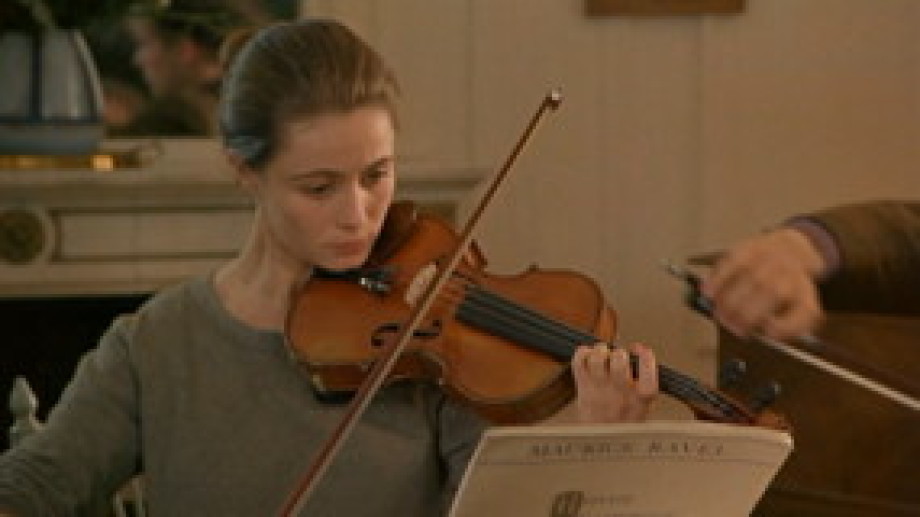
There is a beautiful sub-genre of films dedicated to the art of summing up—usually the work of aging filmmakers looking back on their lives and careers. There is something both modest and reckless about these films, these attempts at synthesis in which, deliberately or no, new patterns, tones, and textures tend to emerge. Maybe seeing a career’s worth of obsessions spread out before us makes us more aware of the face behind or within them, or maybe the filmmaker just gets tired of maintaining any claim to authorial distance—either way, these films often end up being their makers’ most personal, or most introspective. Claude Sautet’s last two films—A Heart in Winter (Un coeur en hiver) and Nelly and Monsieur Arnaud—are firmly rooted in this tradition, to the point that, in some respects, they seem its fullest realization to date.
Un Coeur en Hiver tracks the shifting bonds of a pair of violinmakers—vigorous Maxime (André Dussollier) and withdrawn, mysterious Stéphane (Daniel Auteuil)—and the virtuoso violinist to whom they’re both drawn (Emmanuelle Béart, beautiful in that fragile, impersonal, even unsettling way of china dolls). Béart returns in Nelly et Monsieur Arnaud, this time as a typist hired by a wealthy banker (Michel Serrault) to help transcribe his memoirs. They develop an indescribable friendship, a chaste intimacy that transcends expected clichés about older man-younger woman relationships while still allowing for glimmers of unfulfilled desire.
I’ll leave the autobiographical implications of these works to others, those who know Sautet better or have known him longer. In fact, I’m not sure how to go about analyzing Un Coeur en Hiver and Nelly et Monsieur Arnaud. In the first place, their plain, unadorned style seems intended to deny critics the recourse of dispassionate formal analysis. This is the sort of cinema that’s often called “novelistic,” usually with a hint of derision—mannered, impeccably performed character dramas about love and disappointment, aging and youth. There’s a lot of talk, a lot of food, a lot of suppressed anxiety, the occasional outburst. That the emotional dynamics at work here couldn’t be replicated in any other medium—most interactions of real importance are phrased in a language of small gestures, glances, facial tics and downcast eyes—at once exempts Un Coeur en Hiver and Nelly et Monsieur Arnaud from the “literary” kiss of death and makes them still harder to describe.

I could (and, for a second, will) resort to empty praise: these are supremely empathetic and generous films, devoid of any irony or pretension. They seem torn right out of the stuff of life (whatever that means), to the point where dissecting even something as simple as their sequence of events seems futile—the equivalent of listening to a friend’s life story and interrupting to point out an inconsistency of character or a plot hole. If they occasionally leave threads hanging or fail to satisfy, it’s not malicious: it’s because life doesn’t always satisfy.
Any adulations I can heap upon Un Coeur en Hiver and Nelly et Monsieur Arnaud will be empty not because they're undeserved, but because the films don’t need my praise. These are confident, poised creations, and though they might not dare draw conclusions about their heroes' moral character, or about life in general, they at least trust in their own ability to communicate their protagonists’ longing with undimmed clarity and the utmost dignity. They’re right to do so.
If I feel the need to praise these films anyway, it’s because, as close to perfect as they are, they’re also thoroughly unfashionable. We’ve come to associate greatness with radicalism, formal experimentation, boldness and innovation; Sautet shrugs. His films aren’t even quietly radical. They’re definitely traditional; what’s more, they’re completely unselfconscious about their own traditionalism. Sincere engagement with the creative and relational struggles of the upper classes is so foreign to contemporary cinema that, I fear, many will be inclined to watch the dinner party conversation in Un Coeur en Hiver, a lengthy back-and-forth about elitism and traditionalism, and dub the man behind the camera himself an elitist—if only for daring to take the whole thing as seriously as he clearly does.
Distrust over tradition-of-quality filmmaking comes, I think, from the right place. But it, too, can become just as reactionary as the forms against which it revolts. If we can’t make exceptions for filmmakers as sympathetic and attentive to the complexities of human feeling as Sautet, then I fear we’ve lost sight of whatever truth we hoped to find by diverging from tradition in the first place. The breaking of boundaries is a means to an end, and more often than not, it’s a necessary one. Claude Sautet didn’t need to break boundaries. His powers of observation were so acute that it would have been a waste for him to do anything but what he did: observe the way people in his particular milieu lived, with the expectation that anyone will relate who knows what it’s like to desire the unattainable, to flounder in life and in love, and to occasionally find unexpected moments of connection. “The Things of Life,” indeed.
A Heart in Winter and Nelly and Monsieur Arnaud screen tonight as the final two films in our retrospective Claude Sautet: The Things of Life. See them together and save with our Double Feature package!



